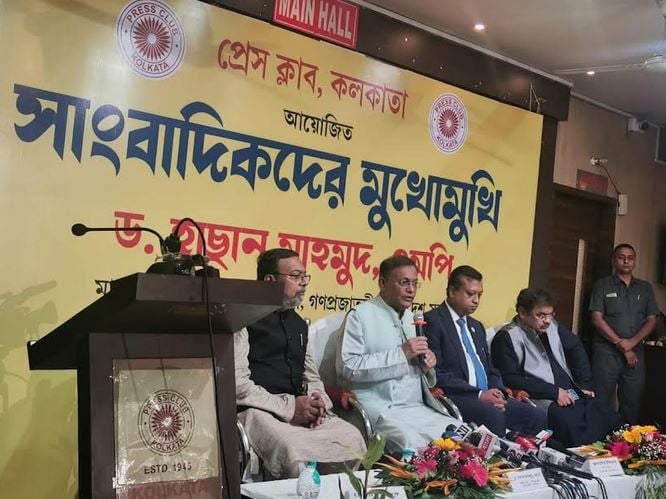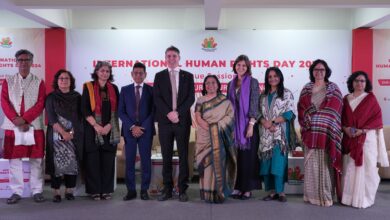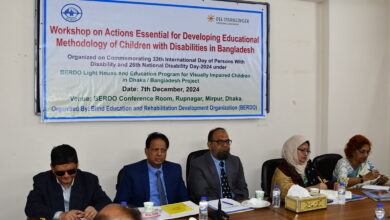Communalism, militancy will raise heads if Awami League doesn’t remain in power: Hasan Mahmud

Information and Broadcasting Minister Hasan Mahmud on Thursday, July 27 said if Awami League (AL) does not remain in power, communal ill forces and militancy will raise heads in Bangladesh.
Replying to a question from Indian journalists regarding whether communal forces would raise heads if AL could not come to power through the next parliament election, Hasan Mahmud said, “If AL does not remain in power, militancy along with the communal ill forces will raise heads in the country.”
While speaking at the open question and answering session of the ‘Face the Journalists’ programme at the Kolkata Press Club, Hasan Mahmud, also ruling party joint general secretary said this.
He said, “When Begum Khaleda Zia was in power, bombs were blasted at 63 districts of Bangladesh simultaneously. Shaykh Abdur Rahman, Bangla Bhai and the people trained in Afghanistan used to stage showdown in public that was the rule of the BNP government.”
Mentioning that when AL took stern actions against the militants, BNP chairperson Begum Khaleda Zia openly said, “Some people are detained, when their hair and beard become longer they are termed as militants.” Hasan Mahmud said, “ If Awami League does not remain in power, communalism of that time will rise again in Bangladesh. The minorities in Bangladesh will fall into uncertainty again.”
He said, “when BNP came to power through 2001 election, minorities from other religions were tortured while mother and daughter were raped in one night, a 14-year-old girl was raped for “the crime of voting for the AL election symbol Boat. At that time, a community kitchen and a shelter centre were opened for the homeless people at the central office of our Awami League in Dhaka.”
Highlighting the ideology of the Awami League, the information minister said, “Bangladesh Awami League is the party that was established as a protester against the communal forces. Father of the Nation Bangabandhu Sheikh Mujibur Rahman called for the Liberation War in order to make the country free from communalism and build a secular state. Our independence was achieved by the combined blood of Hindus, Muslims, Buddhists and Christians.”
The Minister added, “Assuming the state power after the assassination of Bangabandhu in 1975, BNP founder Ziaur Rahman brought back that communalism. Religion-based politics was banned in our country after independence, but it was restored in 1975. Unfortunately, it is true that there are communal forces in the BNP-led alliance. There are many groups whose leaders fought with the Taliban. Many of these leaders openly chanted the slogan ‘Bangla Hobe Taliban’.”
Asked whether the BNP would take part in the polls, Hasan said they claim that the BNP is a party of common people. “But they barred all their party-men from participating in city corporation polls even in the union parishad elections. Despite their efforts, many of them participated in the election as councillors, members and even chairmen,” he mentioned.
Noting that most of the BNP leaders want to join the polls, the AL leader said, “But they cannot do so as their leadership cannot give decisions. Boycotting elections continuously is very alarming for those who claim to be a people’s party or want to survive as a people’s party. If they (BNP) boycott the next election, they will incur the loss even more.”
Speaking about the Rohingyas, the information minister said, “I am from Chattogramg, I have been to Rohingya camps many times. As far I know, currently there are about 15 lakh Rohingyas in Bangladesh. Our country is the most densely-populated country in the world; somehow we have ensured our food security. The huge Rohingya population is a pressure for us, a pressure on the economy. They have to be fed, clothed, and given everything, including medical care.”
About Bangladesh-India relationship, the Information and Broadcasting Minister and Awami League (AL) Joint General Secretary Hasan Mahmud said that Bangladesh maintains a good relationship with India and other countries. “We have cooperation not only in trade, but also in various sectors including security. We feel that it is our responsibility to keep our region safe, maintain peace and stability here,” he pointed out.
Replying to a query of journalists that diplomats are often seen making statements in Bangladesh, he said that no one makes statement in India or Western countries so easily or frequently because it violates diplomatic norms. “We have strongly protested such statements,” Hasan added.
About Indian cinema, he said Bangladesh government has given permission to import Indian films. ‘Pathaan’, an Indian Hindi-language action thriller film, has been released in Bangladesh while some more films are in queue, he said. About Hilsha, he said: “Our Hilsa-export is not stopped. Last two months, Hilsa-catching has been stopped.”
Bangladesh Deputy High Commissioner in Kolkata Andalib Elias, Kolkata Press Club president Snehasis Sur, its Secretary Kingshuk Pramanik and local journalists were present in the event.
Meanwhile, Hasan Mahmud has expressed profound shock and sorrow at the demise of veteran journalist, valiant freedom fighter and former Secretary General of Bangladesh Federal Union of Journalists (BFUJ) M Shahjahan Miah.
As Hasan is now visiting to India, Director of Public Relations of the Information and Broadcasting Ministry Mir Akram Uddin Ahmed placed a wreath on the coffin of Shahjahan Mia on the press club premises on behalf of the information minister.
In a condolence message sent from Kolkata, Hasan Mahmud said that the sad demise of Shahjahan Mia, a talented journalist and skilled organizer, is an irreparable loss to the journalism. He also prayed for eternal peace of the departed soul and conveyed deep sympathy to the bereaved family.





